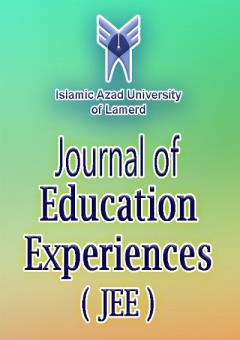Validation of professional competency model based on Islamic teachings of Arabic language teachers in Baghdad
Subject Areas :Khulood Hashim Oudah Al-Geraani 1 , Hamid Sina 2 * , Hadi Alabdolah 3 , Zohre Saadatmand 4
1 - PhD candidate in Educational Administration, Isfahan(Khorasgan) Branch, Islamic Azad University, Isfahan, Iran
2 - Assistant Professor, department of Educational Administration, Fasa Branch, Islamic Azad University, Fasa, Iran
3 - Assistant Professor, Department of Islamic Studies, Al-Qadisiyah University, Iraq.
4 - Associate Professor, department of Educational Administration, Isfahan(Khorasgan) Branch, Islamic Azad University, Isfahan, Iran
Keywords: professional competency, on Islamic teachings, Arabic language, teachers,
Abstract :
Introduction: teachers are one of the main pillars of the teaching-learning process, who play an important role in the quality generation or de-quality of the educational system, and in order to teach and create sustainable learning, the teachers of the educational system must have a series of knowledge and skills and be equipped with professional knowledge and competence. Various models have been presented for the professional competence of teachers. The main purpose of this research was to validate the model of professional competencies of Arabic teachers.
Methodology: The current research is applied research in terms of its purpose, and it was a descriptive survey in terms of the method of data collection. The statistical population of this research was 242 Arabic teachers of Baghdad, Iraq. The sampling method in this research was stratified random. The data collection tool was a researcher-made questionnaire, which was extracted from a qualitative study of professional qualifications model design. To analyze the data, confirmatory factor analysis and structural equation analysis (model fitting) based on partial least squares were used.
Findings: The results showed that all the components and items raised around the four main dimensions of teachers' professional qualifications, including the dimensions of belief in God, belief in science, self-belief and belief in people, were approved and the designed professional qualifications model was suitable.
Conclusion: If the teachers can acquire the necessary qualifications in these four comprehensive themes, they can have an acceptable professional performance in Arabic language education, and on the other hand, this model has the necessary credibility to be used in the Arabic teacher training system.
References
Balakrishnan, S. (2005). Competency based education system. National Symposium on Engineering Education, 90-96.
Bürgener, L., & Barth, M. (2018). Sustainability competencies in teacher education: Making teacher education count in everyday school practice. Journal of cleaner production, 174, 821-826.
Dumitru, G. (2015). Teacher‘s Role as a Counsellor. Procedia - Social and Behavioral Sciences, 180, 1080-1085.
Doležalová, J. (2015). Competencies of Teachers and Student Teachers for the Development of Reading Literacy. Social and Behavioral Sciences. 171: 519–525.
Ganjali, A., Teymourian, M., and Abdul Hosseinzadeh, M. (2013). A study of the criteria of merit in the Qur'an. Quarterly Journal of Islam and Management Research, Volume 3, Issue 1, Volume 7, pp 11- 19. (in Persian).
Kim, K and Kwon,K.(2023). Exploring the AI competencies of elementary school teachers in South Korea. Computers and Education: Artificial Intelligence, 4 (2023) 100137.
Momdjian, L., Manegre, M., & Gutiérrez-Cólon, M. (2024). Digital competences of teachers in Lebanon: a comparison of teachers’ competences to educational standards. Research in Learning Technology, 32.
Prasertcharoensuk, T., Somprach, K. L., & Ngang, T. K. (2015). Influence of teacher competency factors and students’ life skills on learning achievement. Procedia-Social and Behavioral Sciences, 186, 566-572.
Runge, I,. Lazarides,R., Rubach,Ch., Richter , D., Scheiter ,K. (2023). Teacher-reported instructional quality in the context of technology-enhanced teaching: The role of teachers’ digital competence-related beliefs in empowering learners. Computers & Education 198 (2023) 104761.

